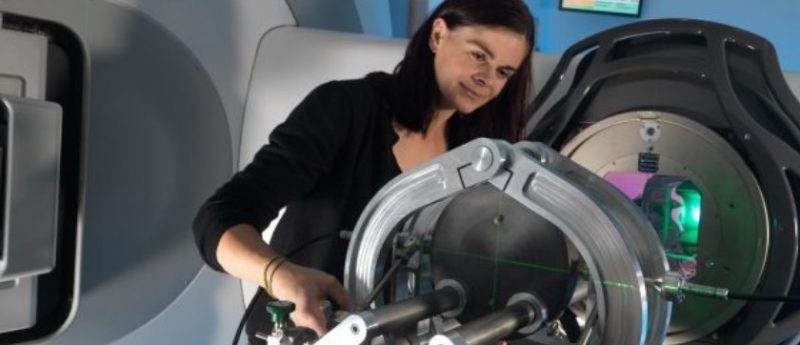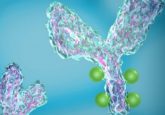End-to-End Treatment Verification for Advanced Radiotherapy

This piece highlights how the UK’s National Physical Laboratory (NPL) is enabling greater confidence in radiotherapy, leading to accelerated implementation of the most advanced techniques and helping to ensure patients receive the same standard of treatment irrespective of where they receive their treatment.
The cancer statistics for the UK are somewhat sobering, one in two people born after 1960 will be diagnosed with some form of cancer during their lifetime [1] and there are currently approximately 330,000 new diagnoses every year, a number which has been growing by around 2% per annum [2]. All of us will be affected by this disease in some way at some point in our lives and when it happens we need the reassurance that we will have access to the best care possible. Despite the significant improvements that have been made in the treatment of cancer over the last 40 years, the UK survival rate has continued to lag behind that in countries of similar wealth [3]. This is manifested in the UK having amongst the lowest age-standardized incidence rates of rich countries, but amongst the highest mortality rates, meaning that fewer people in the UK survive a diagnosis of cancer than should.
The UK has a deserved reputation for creativity and excellence in the design and development of new interventions that have the potential to deliver significant improvements in outcomes. However, one potential cause for the UK’s high mortality rates is the fact that other than in a few leading centres, internationally we are viewed as being slower to adopt new innovations, across all treatment modalities, than other countries, even where those innovations are clearly cost-effective and/or were developed within the UK health system. One of the critical enablers for rapid and widespread adoption of new innovations is ensuring their performance, safety and effectiveness can be measured and optimized in what is necessarily a conservative community.
“It is sobering to note that the value of good radiotherapy is substantially greater than the incremental gains that have been achieved with new drugs and/or biologicals. These results strongly reinforce the importance of doing well what we already know.” Peters et al Clin. Oncol. 2010 [4]
Ground-breaking metrology research supports the NHS England principles
In October last year NHS England initiated a consultation process: Modernizing Radiotherapy Services in England – developing proposals for future service models, which sets out a number of principles to guide the modernization of radiotherapy services and the development of future clinical commissioning products. The National Physical Laboratory (NPL) has played a key role in supporting the UK medical physics community from the beginning of the twentieth century, initially through the design, construction and calibration of specialized equipment alongside the development of world leading codes of practice in collaboration with the medical physicists professional institute to ensure rigorous and consistent dissemination of dose quantification into the clinic. A recent review of data collected by NPL over the last 20 years has shown how the combination of these factors have assisted in considerably reducing the variability of the dose delivered across the nation.
In more recent times, ground-breaking metrology research has been undertaken to support innovative treatments where these complex systems require novel approaches to measurement to ensure continued consistency of the dose delivered to the patient. NPL continues to broaden this role to further enable the rapid, efficient and widespread adoption of advanced radiotherapy technologies thus supporting the NHS England principles to be delivered that will support improvements in patient outcomes.
A focus on the quality of radiotherapy treatment throughout the whole pathway
Towards Safer Radiotherapy states, “comparative audits can provide valuable opportunities to ensure safe delivery of radiotherapy and consistency of patient outcomes”, citing the NPL audit scheme as an example [5].
In 2012 the government announced the £23 million Radiotherapy Innovation Fund (RIF) which was allocated by the Department of Health and Cancer Research UK with support from the Society of Radiographers and other professional bodies. The aim of the fund was to ensure that all radiotherapy centers could deliver a minimum of 24% of all radical treatments using inverse planned Intensity Modulated Radiotherapy (IMRT) by April 2013 [6]; thus vastly increasing the number of patients benefiting from access to this more advanced and targeted form of radiotherapy treatment. At the time it was recognized that in order for this target to be achieved, it would be necessary to deliver much of this using rotational IMRT (RIMRT), a faster and more complex delivery system.
Simultaneously, a national audit for RIMRT was led by NPL and the Radiotherapy Trials Quality Assurance (RTTQA) team to independently verify the implementation of rotational therapy across the UK, to investigate the capabilities of the different planning and delivery systems, assess whether each combination of planning and delivery system had been optimized uniformly across each institution and provide credentialing for use in clinical trials. The audit concluded in 2013, visiting all UK radiotherapy centers who were in a position to participate (around two thirds of all UK radiotherapy centers), demonstrating variability between the centers ability to plan and deliver the same treatment even with the same equipment. The value of this national audit was to set the benchmark against which centers could be assessed and further to support and assist centers to achieve this standard so providing confidence in the ability of these institutions to deliver highly accurate patient treatments. Overall in the UK the variability of the delivery of this technique is shown to be less when compared to the rest of the world, with the UK achieving a 97% pass rate with tighter tolerances than were imposed in a comparative exercise conducted in the USA which achieved a 90% pass rate. Since the conclusion of this national audit, NPL has continued to offer this service to centers who have since commissioned this modality as well as to new centers both within the UK and abroad.
Improved access to radiotherapy trials to include facilitation of radiotherapy trials
“NPL support for independent external dose verification is acknowledged as playing a vital role in safety” Elizabeth Miles, UK Radiotherapy Trials QA group coordinator.
The RIF marked a step change in the delivery of advanced radiotherapy in England; and following on from this initiative the Public Health England Strategy for Cancer 2014 annual report prioritizes the wide scale adoption of innovative radiotherapy technology for which there is currently insufficient provision. NHS England funding has enabled NPL, in partnership with the RTTQA, to play a key role in ensuring the safe and optimized uptake of new radiotherapy techniques and credentialing into clinical trials in support of the Commissioning through Evaluation programme. NPL end-to-end treatment verification services have provided centers with confidence in the delivery of new techniques such as Stereotactic Ablative Body Radiotherapy (SABR) for Non-Small-Cell Lung Cancer and Stereotactic Cranial Radiosurgery (SRS) – a specialist form of radiotherapy that can be used to treat patients with intracranial conditions, such as benign and malignant brain tumors. Both of these national audits have highlighted and resolved issues with inconsistencies in implementation that have resulted in significantly reduced variation in the dose delivered to the patient.
NPL takes a leading role internationally in the development of end-to-end treatment verification techniques, with many countries now basing their audit techniques and protocols on those developed by NPL and its collaborators. NPL is currently leading an international project to develop an audit of auditors, whereby we supply audit groups from across the world with a set of virtual audit measurements containing known errors, which are then analyzed and interpreted by the individual groups and their analysis reported back for assessment. This will allow centers from multiple countries to be included in international clinical trials, which is of particular importance for rarer cancers and/or new techniques such as proton beam therapy, to increase the number of patients that are able to participate in the trial.
The unique relationship between the UK’s National Measurement Institute, NPL and the national clinical trials team (RTTQA) allows the further development of end-to-end audit for new advanced techniques such as proton beam therapy, MRI guided radiotherapy and molecular radiotherapy that will allow the establishment of new clinical trials for these modalities. With any audit or credentialing exercise one of the primary considerations, alongside accuracy, should be cost effectiveness. Pettersen, Aird and Olsen have examined this issue and stated that “The number of patients required in a Randomized Clinical Trial may be reduced by introducing appropriate dosimetry QA, as the risk of under-powering the study is minimized. Dosimetry QA in clinical studies is therefore cost-effective”.[7]
REFERENCES:
- www.cancerresearchuk.org/health-professional/cancer-statistics/risk/lifetime-risk
- www.cancerresearchuk.org/sites/default/files/cruk_research_strategy.pdf
- http://scienceblog.cancerresearchuk.org/2015/08/05/cancer-survival-in-england-is-improving-but-still-lagging-behind-similar-countries/
- Lester J. Peters, Brian O’Sullivan, Jordi Giralt, et al Critical Impact of Radiotherapy Protocol Compliance and Quality in the Treatment of Advanced Head and Neck Cancer: Results From TROG 02.02 Clin. Oncol., 28(18) (2010)
- www.rcr.ac.uk/system/files/publication/field_publication_files/Towards_saferRT_final.pdf
- www.ipem.ac.uk/Portals/0/Documents/Publications/Public%20information/Radiotherapy%20Innovation%20Fund%20Report.pdf
- Pettersen, Aird and Olsen, Quality assurance of dosimetry and the impact on sample size in randomized clinical trials Radiother. Oncol. , 86(2), 195-9 (2008).
ACKNOWLEDGEMENTS: The authors acknowledge funding from the National Measurement System.
KEYWORDS: Radiotherapy, dosimetry, radiosurgery, verification, intensity modulated radiotherapy (IMRT), quality, audit
Rebecca Nutbrown, Head of Metrology for Medical Physics, National Physical Laboratory: Rebecca obtained her BSc (Hons) in Physics from Imperial College of Science Technology and Medicine (London, UK) in 1994. She went on to pursue a career in Radiation Dosimetry at NPL receiving her MSc (Distinction) in Radiation and Environmental Protection from the University of Surrey (UK) in 1999. Rebecca ran the Radiation Dosimetry group from 2007 to 2016. (Prior to this, since 2004, she was group leader for the X-ray and Chemical Dosimetry Group). She has overseen the installation of the new NPL clinical linac and since led the development of related projects and collaborations. Since 2016 she has been responsible for setting up and leading the Metrology for Medical Physics Centre at NPL.
Dr Catharine Clark, Principal Research Scientist and Head of Clinical Translation for Medical Physics, National Physical Laboratory and Consultant Clinical Scientist, Royal Surrey County Hospital NHS Foundation Trust: Catharine completed her PhD in Radiation Physics in 1998 at University College London (UK). She then moved to Paris, France, where she worked at the Institut Gustave Roussy and then at Stanford University (CA, USA). Her research interests are focused on the practical implementation and dosimetric verification of IMRT and rotational radiotherapy. She has also worked in the development of quality assurance in advanced radiotherapy trials and developed a credentialing program for IMRT trials in the UK. She recently led a national audit for the use of rotational therapy in the UK, which was awarded the highest scored physics proffered abstract at the ESTRO 2nd Forum Geneva April 2013 and has published 30 research papers and 90 conference abstracts on these topics. Catharine holds a joint post at the Royal Surrey County Hospital (UK) and NPL and is a member of the NCRI radiotherapy trials QA group.




